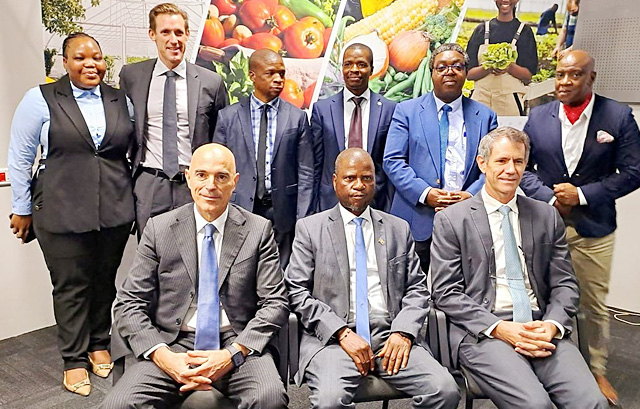By Mbongeni Mbingo | 2018-03-04

What did Martin Dlamini promise us last year? What did he say about making this economy work; about jobs; about plugging the gap, so that money was used wisely?
What did he promise to give us in return? In fact, it is legitimate to also ask ourselves after a full term in office, what Martin Dlamini and his colleagues at Hospital Hill have left us in terms of the economy—a vibrant economy, or worse off than they found it?
It is a fair question, given that the minister of finance is a very reputable finance guru, having spent his lifetime at the Central Bank of Swaziland as governor. When he assumed his political life, there was optimism all round that he was the right man to steer us into austerity that would propel us to achieve our 2022 vision.
But here we are, on his last budget, and the minister has failed dismally to show any sort of ingenuity that would have been expected from a man of his experience. Admittedly, this budget was always going to be difficult, but going through it, one gets the sense there was never any thought and care about what it would mean to the poor. In my head, the minister has done the easiest thing he could have; which is find ways to fund the spending—and then take whatever money you can.
I knew the moment that the minister announced the VAT increase to 15% that this was not thought-through—that he simply did what he had to do. Many will argue that it made sense to adjust the VAT and follow in the footsteps of our neighbours, who announced a similar increase a fortnight ago, this because it apparently makes things easier for whatever that needs to happen between the two countries. But, here is my issue with this, and why I am convinced that the minister and the people who work on this budget have cheated the Swazi public. Firstly, I would think that South Africa had been working on this and knew what they were doing long before they took the decision to increase the VAT. They must have had good time to figure the pros and cons. So, our government taking this direction, what then did they consider? How far did they weigh the pros—and this in less than a week? It seems the easiest decision to make, to increase VAT and without considering what the implication and impact really is going to be for an economy that already is on its knees and obviously, with so much unemployment.
The second point with this increase is that obviously, South Africa is still to debate this, and what are the chances it will be knocked back? If it was, then what would happen—would Swaziland then also follow suit? This copy and paste syndrome exposes our politicians as having very little tact and care on the bread and butter issues. I would have hoped the government would have worked hard to retain the VAT percentage where it was, and then obviously monitor what scenarios play out in South Africa to consider if this was going to work for us. The argument, by the way, that we have to do as South Africa do with this increase, for ease of aligning the collection is totally ludicrous, it does not deserve any consideration. As a country, we have to do what’s best for the country, not what other countries determine (and I suppose that is why we are not copying other people’s systems of governance, mind you). Besides that, we can’t sit here and make things easier for the officers responsible for working the sums through, and therefore just simply tax the people to make it work. It is insensitive to the plight of the people, and being unrealistic to the situation on the ground.
Poverty
It is preposterous to imagine that people are now going to be driven to poverty just because we are lazy to figure out how the variation of the VAT between the two countries works out. South Africa’s economy, although itself in a precarious situation, is far better than ours in comparison. Increase this VAT by a percentage point drives everything up. In a country that was already wobbling under the weight of unemployment and obviously inflation, driving food prices up should not be longer than a few weeks’ decision. For good measure, the minister and his Cabinet are going to endorse a tariff increase on power. This was unthinkable even last year before the 15% increase; and yet it seems inevitable again this year. What irks most is that it appears Cabinet and the finance minister are happy to ensure that electricity is also now VAT rated—at 15%! What would that mean, other than making electricity the exclusive preserve of Cabinet, and others? What would it mean other than that it would take from our pockets? It means that again, that would ensure food prices go up, and many other commodities. It would also make it difficult, as if it wasn’t, to bring in investment, to at least bring in jobs into this country.
Investors
The Swaziland Investment Promotion Authority (SIPA), which has been struggling to bring in investors, will no doubt find it even harder to convince investors that Swaziland is a sensible business destination. But, this electricity hike and the decision to impose VAT on it shows Cabinet’s fragrant disregard for the situation on the ground. Clearly, they have their heads buried in the sand. It is a given that the minister has to find ways to finance the budget; without a doubt. It is understandable that he has to navigate very difficult situations to make us stay afloat. Faced with a difficult situation like this, the minister is expected to perform some magic and give us all hope that things will get better. In an ideal scenario, when the government has to increase taxes this much, taking from the public in every possible way imaginable, you would expect some kind of direction as to where the money will be spent—and then how it will benefit the people who are being taxed.
Martin Dlamini cannot just tax, tax, tax, without so much as considering where the gains for the public will be. That is dangerous, and asking for trouble. This is also the same thing he is proposing to do to the banking industry, where he has announced that he intends taxing their revenue.
How is this not going to lead to unemployment? Not that banks do not reek in the billions of Emalangeni in profits, but obviously, the government has been tightening the screws on the banks in the past couple of years, there is a danger these are being tightened too much too soon. At this point, it is going to add to an already volatile situation in the banks, the Nedbank strike being a perfect example of what is on the horizon if we are not careful.
So, what should the minister do then? The answer, from where we stand, is that Martin does not propose any single austerity measure. In fact, I am shocked government continues to ignore the biggest drain in the economy—which is underperforming parastatals some of which are refusing to be audited.
The biggest problem with this economy is that government officers are no longer in the offices; they are in the planes, every single day. Even ministers have made this a habit. They are flying business class too. The numbers are increasing by the week too, with every officer demanding an external trip. Then there is rampant corruption. The money we are being taxed isn’t going where it should. Accountants everywhere are making a killing, so too are those who are clever to manipulate the situation. Yet, corruption cases in the courts are nowhere. The Anti-Corruption Commission has been turned into a white elephant, with no political marcel. The Judicial Service Commission has done its best to destroy the credibility of the Judiciary, and judicature is for sale.
And that is not all, on Friday the prime minister announced a new commission to review salaries for politicians, and boards which will inevitably call for improved salaries and perks for everyone—regardless of the situation. It will not, for instance, call for cuts. But, that is not Martin Dlamini’s fault. The finance minister’s fault is not spending enough time and energy standing and arguing for the cause of the average person out there, so that when he runs out of breath we know he tried. Instead, he has left us with a legacy of the man who could not stand the heat.
share story
Post Your Comments Below

GET ready to groove this weekend at the House Musiq Festival (HMF)!
Join in on the party as...

Sisonkhe FC ……........….. (0)2
Mpendulo 55th, Thab...

The E851million Smallholder Agricultural Productivity Enhancement and Marketing Project (SAPEMP) ...
Health officials have reported a significant decrease in new HIV infections among men, in...
All material © Swazi Observer. Material may not be published or reproduced in any form without prior written permission.
Design by Real Image Internet